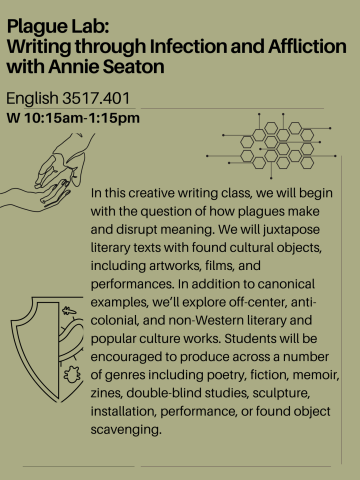Plague Lab: Writing through Infection and Affliction
Instructor: Annie Seaton Add to cart
How do we write through a plague? How do we make sense of it and ourselves? Do plagues also super-charge creativity? Is it a coincidence that so many famous literary works seem driven by pandemics? In this creative writing class we will begin with the question of how plagues make and disrupt meaning. We’ll start with ancient and classical examples: from Homer’s Iliad to Boccaccio’s Decameron, pandemics inspire upheaval and revelation. Oedipus Tyrannus seeks to solve the riddle of a social disease: Oedipus’s contact tracing leads to self-mutilation. In English 3517, our own plague laboratory experimentation, we will juxtapose literary texts with found cultural objects, including artworks, films, and performances. In addition to canonical examples, we’ll explore off-center, anti-colonial, and non-Western literary and popular culture works. Our lab will also investigate reactionary, paranoid, and cult-like pandemic meaning-making: theories conflating 5-G transmission and vaccines, for instance, and the persistence of xenophobic viral “origin stories.” We will use these examples to ask questions about our own “plague”: does Covid-19 represent a break with social norms and expectations? Does a work like Octavia Butler’s Parable help us understand whether our current pandemic began with Covid-19, or was already forecast in what Butler terms the “Pox”? We will perform our own archival assemblage and collective work of evidentiary gathering:—the CDC refers to epidemiologists as “disease detectives,” so how might we as writers do our own detective work? Students will be encouraged to produce across a number of genres including poetry, fiction, memoir, zines, double-blind studies, sculpture, installation, performance, or found object scavenging.
-
Creative Writing Workshop Course Minor (AECW)

 Department of English
Department of English
